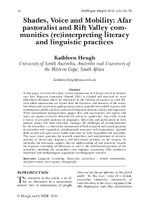Shades,voice and mobility: Afar pastoralist and Rift Valley com- munities (re)interpreting literacy and linguistic practices
Abstract
In this paper, narrative data from remote communities in Ethiopia reveal in intimateways how ‘linguistic citizenship’ (Stroud 2001) is claimed and exercised to resisteducational decisions which are insensitive to the rhythms of pastoral or rural life.
Even where communities are distant from the discourses and resources of the centre,
individuals and community spokespersons express powerful views which resonate with
contemporary global and local concerns of linguistic diversity, literacy and migration.
While conventional representations suggest that such communities lack agency and
voice, are require externally delivered aid and to be ‘spoken for’, this article reveals
a matrix of articulate positions on language/s, literacy/ies and participation in both
primary school and adult education. Amongst the challenges of (re)interpretation
for the researcher is a discordant intersection of fluid temporal and spatial positions
of researcher and respondent, simultaneously translocal and transnational. Agitated
shifts in time and space recast shades and voice for both respondent and researcher.
This paper raises questions for research procedures and interpretation of narrative
accounts of literacy(ies), linguistics and educational practices on the margins. In
particular, the discussion suggests that an understanding of and sensitivity towards
the linguistic citizenship of informants as well as the multilayered positions of the
researcher, including the researcher’s own linguistic citizenship, offer productive theoretical and methodological approaches to ethnographic research.

